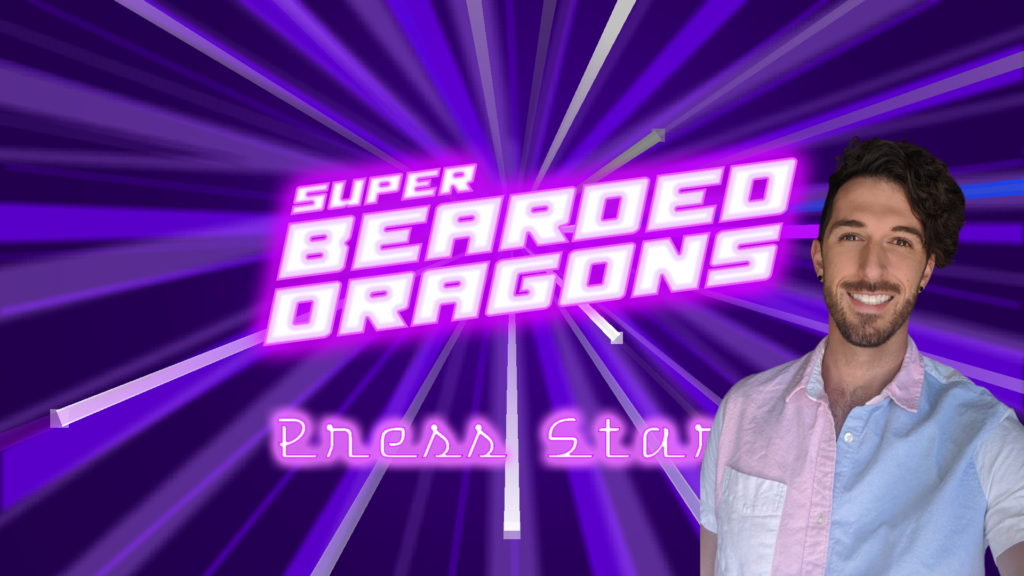
Spotlight on… Greg Bayles and Super Bearded Dragons
Super Bearded Dragons is a new game by Greg Bayles which is currently open for funding on Kickstarter. Described as a lightning-fast indie brawler where bearded drag queens fight over cash tips that rain down from the sky, Super Bearded Dragons looks like a lot of fun!
Greg is a self-taught developer and part time drag queen! This is his first game he’s bringing to publication and I had the opportunity to chat to him about his career and the game.
Hi Greg, thanks so much for taking time out to talk to me. Let’s start out with you introducing yourself to our readers
My name’s Greg Bayles, and I’m a video game developer and drag human living in Salt Lake City, UT. By day, I work as a project manager developing medical video games at the University of Utah, and by night, I develop queer, post-religious, and activist indie games. I also teach “alternative” game development one evening a week! I’m a lover of rock climbing, cooking, whiskey, and cats.
I’ve done drag under a few different names, but my current alter-ego is Pyxl Gorgeous, a game developer glitch witch with a love for all things lavender and an eye to the future of technology. Pyxl is a cosmic shapeshifter and loves playing with gender presentation and body shape to create wild illusions. She also loves hosting drag “coming out” parties for first-time queens.
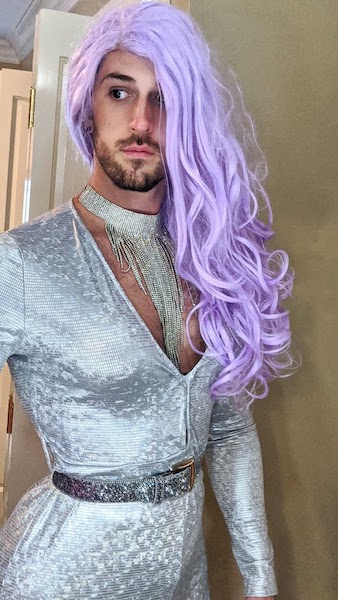
Tell me about Super Bearded Dragons
Super Bearded Dragons is a lightning-fast, four-player platform fighting game that explores identity and conflict through the tongue-in-cheek battles and cash-grabbing antics of bearded drag queens.
Players face off in quick-pickup, samurai-style combat, using a variety of drag-inspired attacks and a full wardrobe of zany items to sashay to victory. Every time a queen gets hit or falls off the stage, cash tips rain down from the sky, and the player with the most money at the end of the round takes home the crown. Players explore a range of unique stages inspired by traditional fighting games but which have been subverted to represent various queer spaces, including clubs, dating apps, festivals, the NYC piers, bathhouses, and other unregulated spaces.
Super Bearded Dragons builds on the accessibility of Super Smash Brothers, the simplicity of indie treasures like Samurai Gunn, and the glitz and camp of RuPaul’s Drag Race to deliver all the spectacle of a traditional fighting game with all of the heart and gusto of a seven-foot-tall bearded lady singing her heart out to Whitney Houston. Though openly an homage to all things silly and sparkly, Super Bearded Dragons still somehow manages to say something honest and important about drag and identity, through a language of sassy mermaids, wardrobe changes, and unreasonably contoured eyebrows.
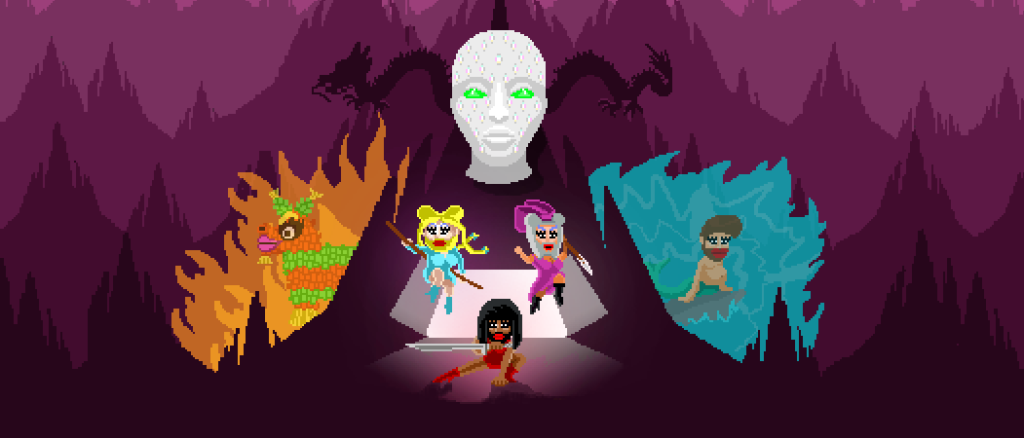
Where did the idea come from?
I had developed a game jam project around the concept of a heterotopia, or a small “other space” that disrupts, and at the same time mirrors the larger world. I spent a month or two building out a female heterotopia, and thinking about what conflict, or social structures, or wars might look like in a game world populated only by female characters. This got me thinking about queer heterotopias, and one day at a game development meet-up, I threw out the concept, and the name, Bearded Dragons, and the rest is history.
I have been part of the drag community for the past four years or so, so in a big way, Super Bearded Dragons became a receptacle for all the spectacular things I was experiencing in the community. Many of the locations are reimaginations actual locations or events I’ve attended, or draw inspiration from historical queer spaces. The characters, likewise, represent influential queer character in my own queer journey and draw broadly on LGBTQ+ archetypes for inspiration.
I played a lot of fighting games growing up, and spent countless hours in Super Smash Brothers for the N64, so the platform fighting game made a lot of sense to me as a genre. I also loved the idea of samurai drag queens, and of the blending of the often hyper-masculine and performatively masculine fighting game aesthetic with the campy, performatively feminine aesthetic of drag.
Tell me about the cast of characters
The characters in Super Bearded Dragons are, in a lot of ways, based on real people, or else draw inspiration from artifacts of drag culture. Not necessarily just drag queens either, but all sorts of characters I’ve met or been influenced by in my life. Some of them are my past personal drag personas, like Petti Revenge. She is sort of a vindictive rocker babe slash hired gun. She started out as a reinterpretation of Uma Therman from Kill Bill, but with some Storm vibes from X-Men.
Other characters are inspired by pop figures or artifacts, like Gayja Vu, who has a suspiciously Lady Gaga-esque pink Joanne hat. Beardra the drag hag, who at one point in the story mode traps you inside a Ouija board, definitely channels Winifred Sanderson. Then there’s Dominatia, who is sort of a BDSM/Folsom interpretation of Vega from Street Fighter. Wooby, who’s the drag personification of Mugatu. Tons of other little references, and hopefully points of connection for people.
I think more than anything, though, it was super important for me to include characters from all walks of life, all ages, all types, and it was especially a goal to have black and brown queens front and center. There aren’t a ton of queer people of color as leading roles in games, even though they have driven LGBTQ+ progress in a big way, so I wanted this to be something that honored the sacrifices and the struggle that a lot of folks endure.
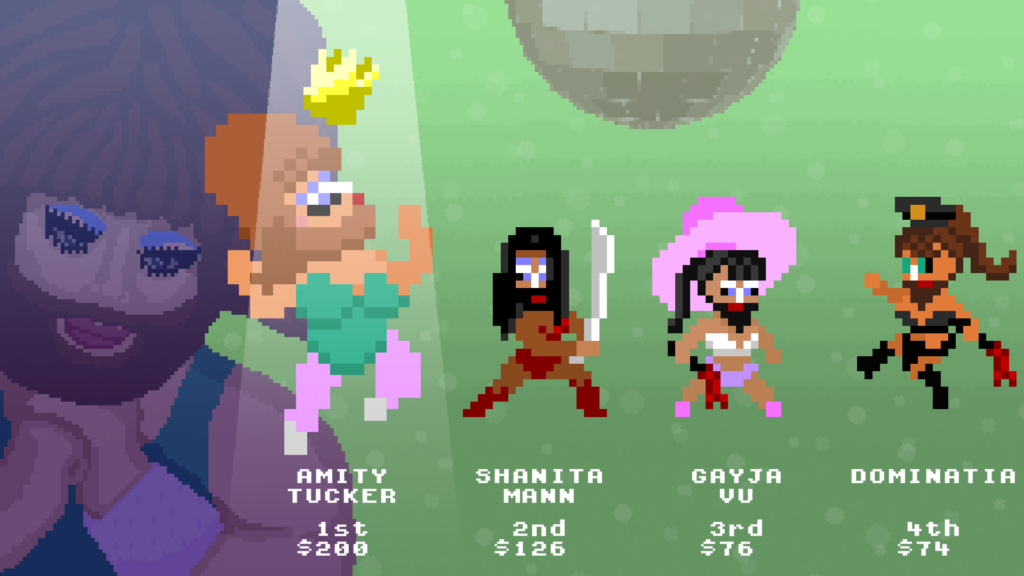
What was the inspiration behind the different levels?
I pulled from a lot of historical LGBTQ+ sites in creating the levels. I’ve read a lot about the New York City piers of the 70’s, for example, and how they became such a vibrant third space for sex workers, artists, and others, and that was something I wanted to pay homage to in my work. You often see docks and piers in traditional fighting games as well, so it seemed like a natural pairing on that count.
Other levels are based on bathhouses, or clubs, or concert venues that I’ve visited. There’s one that’s based loosely on a gay bathhouse in Bangkok. Another is a recreation of a fairly well known outdoor concert venue but reimagined as giant lipstick tubes. Another is the rooftop of a now-closed bar in Los Angeles. I really wanted to capture the essence of these spaces, and allow for some aspect of play and understanding in each of them.
There are also a bunch of levels that are more abstract in their approach: a gay dating app turned into a scrolling platformer level, a dressing room blown up to gargantuan proportions, a level taking place entirely inside of a Ouija board. They really run the gamut in terms of breadth.
You’re a completely self-taught game designer, what got you into it?
God, honestly, Hyper Light Drifter was what ACTUALLY got me into it. I remember when that game first hit Kickstarter, I was so blown away by it, especially with it coming originally from such a small team. I remember looking up Gamemaker, and reading reviews, and seeing that it was one of the quicker engines to pick up, so I just started learning on YouTube.
Growing up, I had been really inspired by games like Flashback, which was designed entirely by Eric Chahi. I also loved Earthbound, which was made by a bigger team but which pulled its comedic sensibilities and charm from the brilliant Japanese script by Shigesato Itoi, and the groundbreaking & breakneck translation/writing work of Marcus Lindblom. These were impassioned individuals putting their all into their work, and really connecting with the player.
I never thought I would actually go into game design, but as a teenager, I played around in the Warcraft III World Editor a lot and made a few little games. Then I kind of swore off games throughout college, only to return to them from a narrative perspective. I was studying English lit, and digital literacy, and everything I would write about game narratives would get published in a second, and everything I was writing about Shakespeare or Milton or any of the more traditional lit topics would go unread. Finally, after a while of this, a friend suggested that with as much time as I was spending thinking about games, that I might as well just make games! And so that became the impetus for learning to code, and eventually getting a job in games!
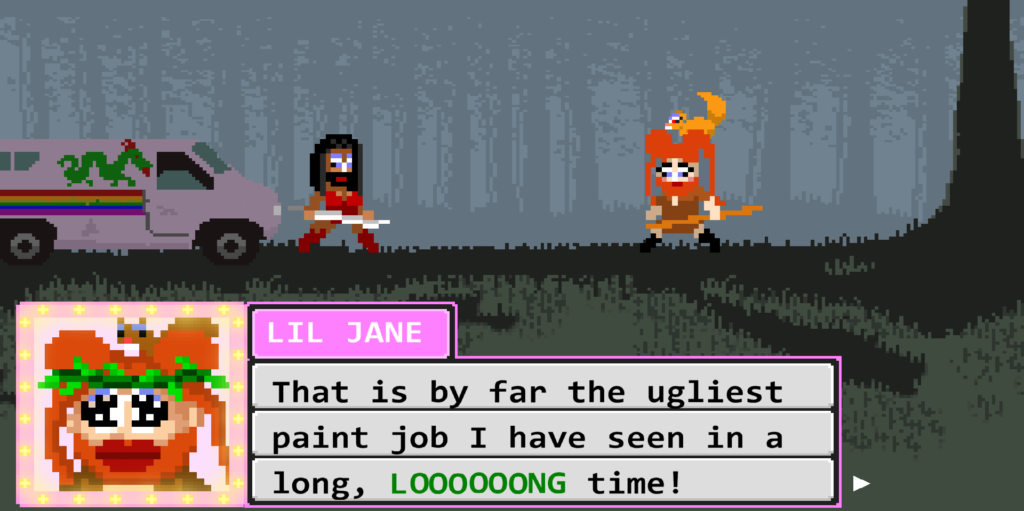
Was it your aim to release a full game when you started out?
Not at all! I set out to publish something tiny in three weeks! But I built the prototype, and people liked that, so I built a more fleshed out prototype, and they kept asking about that, and then things just kept happening that pushed the project forward.
I still wasn’t planning on making anything big of the game, but then I applied to the Smithsonian American Art Museum Arcade, and they accepted it! That’s kind of when I knew I would continue working on this until I could fully release, as a real title. There were like 25,000 people that came through the museum over a two day weekend, and it was just so encouraging to see so many people playing it and having a good time. So yeah, that’s how a three-week prototype turned into the next two years of my life!
You spent some of 2019 taking Super Bearded Dragons out to shows and festivals, what has been the early reaction?
Honestly, it couldn’t have been better! I wasn’t feeling very confident about the game before I started taking it to festivals. But seeing it in other people’s hands, and hearing them tell their friends about it just made it make sense. I remember in DC, at the Smithsonian American Art Museum Arcade, there were kids who showed up the second day to play my game, because a friend who had attended the previous day had told them about it, and something about that was really special for me.
There was another really cute moment for me last Christmas, when out of the blue, I got an email from a random mom saying that their kid had played Super Bearded Dragons at a festival, and literally the only thing he wanted for Christmas was a copy of the game. It wasn’t in any sort of real state of readiness, but I had the biggest smile on my face when I sent off that email with a copy of the alpha. I think moments like that make all the late nights and struggle worth it.
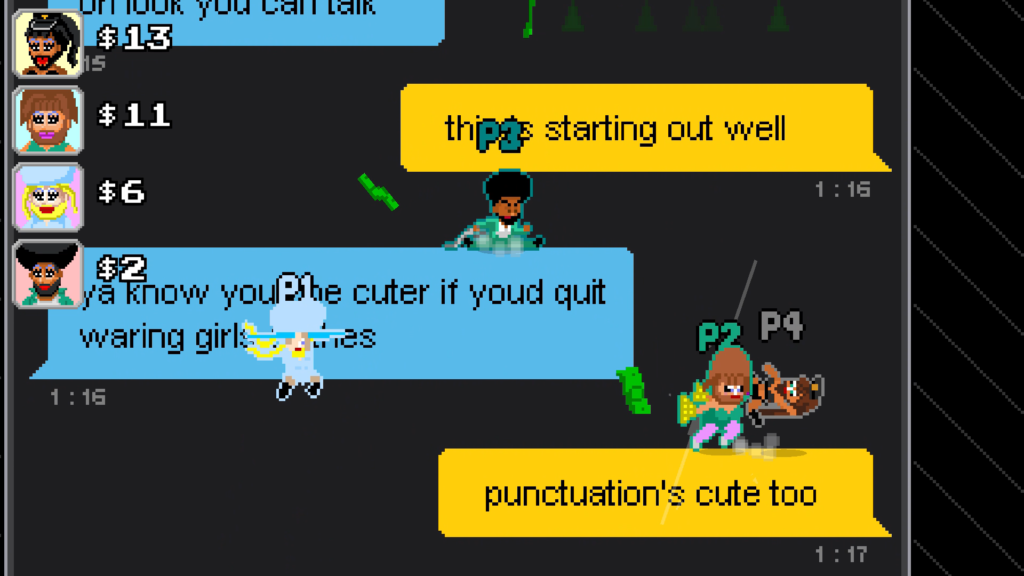
How has COVID affected the development of the game?
Absolutely. I honestly thought I had a viable launch ramp for the game: I had three or four festivals lined up, a couple of big drag events that I had organized, and a regular group of play-testers to help me to get the game ready for all the events. Cue COVID-19. The playtests had to stop. My work and home life got completely upended as we tried to adjust to the new challenges. And perhaps most significantly, I watched my launch ramp crumble before my eyes as festival after festival was canceled.
I found myself suddenly with a game but without a way to test it, or to promote it, or to really even inspire future content, since all travel was grounded as well. I really didn’t know what to do, and I definitely fumbled around for a few months before deciding to just move forward, and try to make the best game I could.
I took a couple of months exploring online play, which hadn’t been on the docket previously but which was proving to be more and more necessary as the quarantine went longer and longer. I spent some time writing more sophisticated bot AI, so that solo play was more viable. And I expanded what was originally a minimal story mode to include a much broader story arc. All of this, of course, took time, but I think the game’s going to be a lot better in the long run.
I’m just having to be patient with myself, and my deadlines, and be okay trying things I’m not comfortable with initially. I fail a lot, but I think I’m moving toward something worthwhile and beautiful. No saying how long till I get there!
What was the driver to get a Kickstarter going?
More than anything, I was looking to formalize some of the marketing materials and start building an online community around the game. Obviously, having more resources would help to speed up the game’s development as well, and would let me hire on composers and things like that.
At the same time, I am a game developer first and a business person second, and I think forcing myself to take the time, and put in the resources, to be able to formalize the game content, has been really important. I’ve had things like a trailer on my back burner for months, and this forced me to be a little bit more critical in how I was thinking about the game and presenting it to other people, and forced me to put in the time to get some assets put together!
One of my biggest goals is to get Super Bearded Dragons on the Nintendo Switch, and getting the Kickstarter content together was definitely a big step toward that dream!
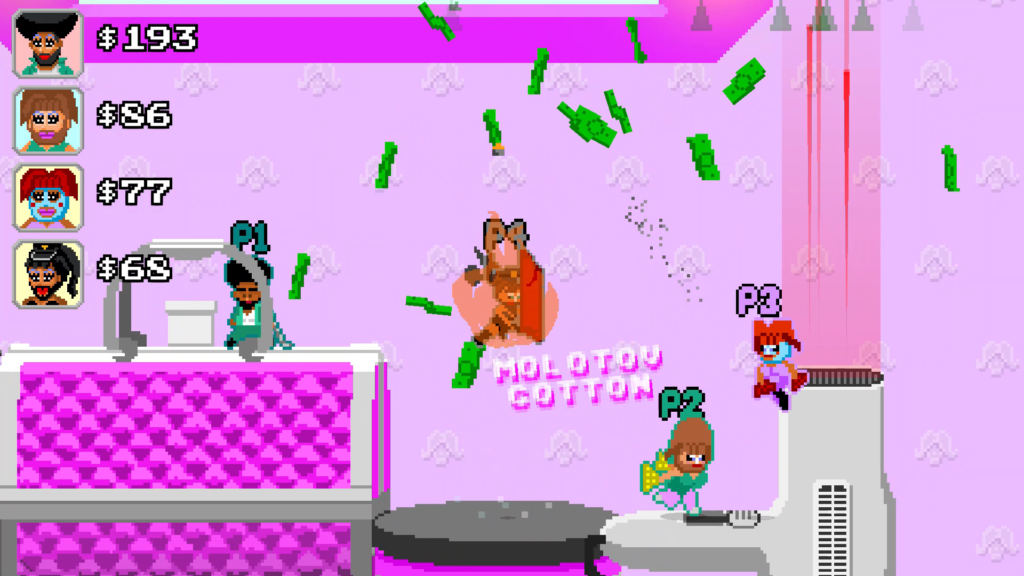
You also do drag in your spare time, what do you love about drag?
I just love how wild and free it can be. I’m a bit of shapeshifter, so drag becomes a way of exploring different facets of my personality and literally trying on different appearances. I definitely take myself too seriously sometimes, so it also becomes a way for me to let go of control a little bit, and let some of my walls down. It’s pretty transgressive, by nature, so I feel like you end up exploring a lot of feelings, and identities, that you might not otherwise be able to explore.
How did it all start? Were you a Pride queen or Halloween queen?
It was in 2017, in a Vancouver drag show that would change my perspective on drag forever. You might think it would have been RuPaul or some other star I had seen that night, but no, it was a budget queen who had been doing drag for only six months or so.
She’s painted Elphaba green for Wicked, but other than that she’s in what I remember to be just a sort of frumpy, shapeless, 1970’s-couch-colored frock. She’s got sunflowers pinned in a matted brown wig. No boobs, no pads. Just hairy ‘boy-body’ and spaghetti straps.
She starts singing, and midway through comes the reveal, where off comes the ungodly mumu, and underneath is a shimmering, sequined cocktail dress. She’s got the whole audience captive as she glitters her way around the room singing and climbs up on the bar. She’s nearing the end of the song when she reaches up and starts peeling the sequin dress off, neck down, to reveal nothing more than a pair of ratty, old, gray whitey tighties. And as the song draws to a close, she’s perched there atop the bar–resplendent as ever, with her hairy shoulders and love handles–singing her heart out, in a pair of dirty whitey tighties. And it’s at that moment that I realized that in the end, it’s all drag. Underneath all the sequins and the mumus and all of our curated selves, we’re all that same green-faced, pudgy guy in dirty whitey tighties, singing our hearts out, hoping others will hear our brave song and love us for it.
It’s also at that moment that I realize a lot of people do eventually manage to rip off the mumu and are excited to show off their glittery, sequined selves, but getting to that washed-too-many-times whitey tighty realness takes a lot of work and a lot of honesty. So a couple days later, I flew back to Salt Lake City, and I didn’t have a drag mama, and I had never done makeup, but I decided I was going to host my first drag party. I invited every queen I had ever heard of, and all my friends, bought a ton of dollar store makeup and thrifted wigs and dresses, and we kiki-ed in bad drag until the morning. It all just kind of unlocked something in me, and the rest is history!
Why do you think so many drag queens are gamers?
I think for a lot of people, games are a way of experiencing a different life than the one you’re given. You get to populate a different world, and deal with different challenges, and meet different and often more interesting characters, and so in a big way, it’s expressive and creative and exhilarating to play a game. I think drag is very similar, in the sense that you are trying on different personalities, and exploring a different world—seeing the world through different eyes. I remember the first time I ever went out in drag, none of my friends even recognized me, and I thought to myself that that was the first time I could really set aside the self and experience the world without the lens of Greg. So there’s in some ways a sense of escapism and in other ways a sense of fuller expression—of being able to assume identities and roles you might not otherwise be afforded.
When we talk about something that’s amazing in the queer community, we sometimes use the world fabulous, but what that literally means is something belonging to fables. Things aren’t impressive: they’re sickening. When we love something we live! When I was amazed, I died! We love the outrageous, the hyperbolic, the impossible, the visceral, and I think drag and games both tap into that sense of exaggerative wonder. The possibilities are endless and something unexpected is just around the corner.
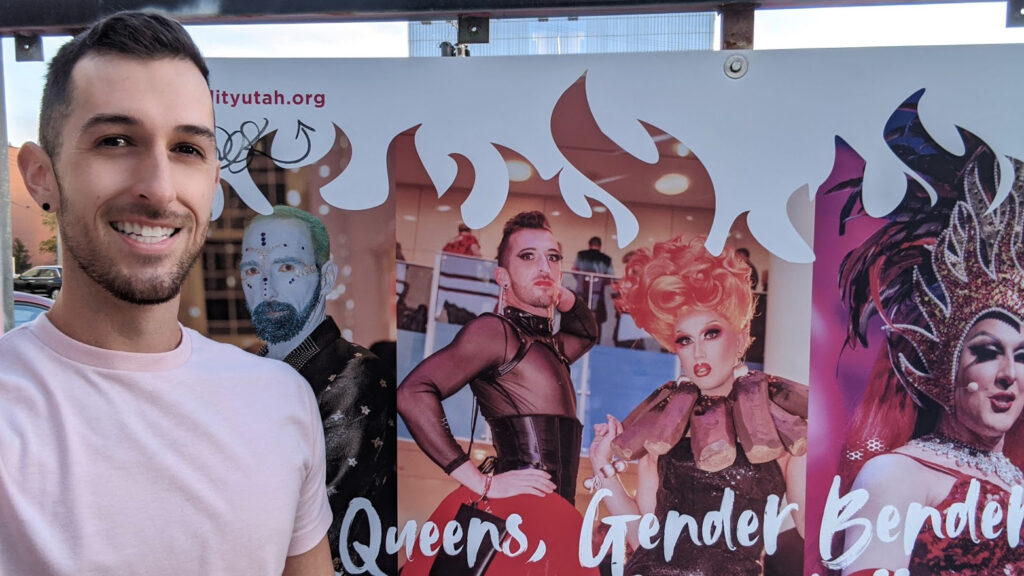
You live in Salt Lake City, the heart of Mormondom, how do you find being queer, a drag queen and developing an LGBTQ game in such a religious area?
You know, Salt Lake City itself is a beautiful, liberal jewel, so I’m doing weird, queer things in a strange place, but I’m not doing them alone. Obviously, the Mormon church influences politics and some aspects of daily life in Salt Lake, but you also end up with this really beautiful counter-culture of tattoo parlors and microbreweries that has sprung up in the wake of Mormonism.
I definitely get some weird looks when I go out in drag, or when I tell someone about my game, but I get just as many positive responses from post-Mormon folks who are finding their way through life after Eden, and that becomes a huge source of support and connection.
I think the biggest thing is Salt Lake is that you find what you seek, so I’ve been able to find a really beautiful, transgressive, supportive queer community here that inspires me to do more every day!
What was your earliest memory of video games as a child?
My older brothers played a ton of games, so I grew up watching them, and learning all the tricks from their play-throughs. They would always play Super Based Loaded on the SNES, and I didn’t really understand it, and I didn’t really like baseball, but it became my favorite game, and I would play it with all my friends. As far back as I can remember, games have been a way of bonding, and I still, by the way, play games with my brothers on a fairly regular basis. I have my own controller now, though!
What was the one game that defined your childhood?
The most influential one has to be Earthbound. I played through it so many times as a kid and loved its honest, lighthearted take on life. It had a way of dealing with everything from police brutality to loss, in a way that made you almost laugh and cry at the same time. I remember feeling like it spoke to me in ways that no other game had done before. There’s this one moment, late in the game, where the game talks to you, the player. But it talks to you by name. By your personal name, not the character’s name. See, when you set up the game, it asks you for your name—you, the player—and later confirms it, but then you play 30 or 40 hours worth of the game without it coming up at all. And then, in that pivotal moment, when you’ve just overcome a huge challenge, there on the wall in lights, the game speaks to you. Greg. By name. And it talks about how far you’ve come, and how you’re growing stronger with every step forward. And something about that experience has never left me, and has inspired me through my whole life! It felt like the game knew me in a way that I didn’t even yet know me.
As a break from your own, what games do you enjoy playing now?
I’m an inveterate League of Legends fanatic, so that’s my number one go-to when I have a free hour. I play support primarily and love Karma, Nami, and Taric. My brothers love strategy games, so we’ve been playing lots of Sid Meier’s Civilizations and Ark: Survival Evolved. Recently I’ve been playing through lots of little indie titles, and I get to play my students’ games often as well, which I love! I’ve always been a big fan of board games as well, so I play lots of Jackbox, Settlers of Catan, Secret Hitler, and recently, Pandemic.
How can our readers find out more about you and the game?
I’m on Instagram as @gregbayles personally, and @thatdraggame for the game.
The best place to learn about the game is the Kickstarter page, at www.kickstarter.com/projects/thatdraggame/super-bearded-dragons or on the website at www.superbeardeddragons.com/.





